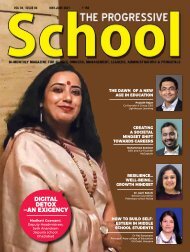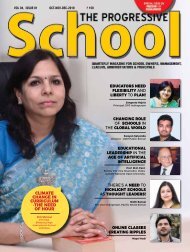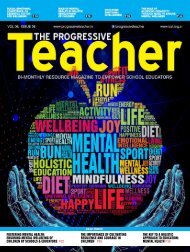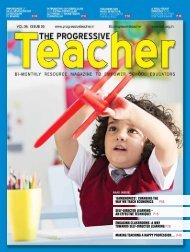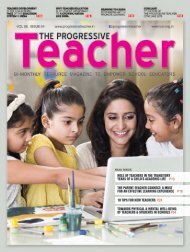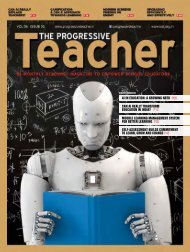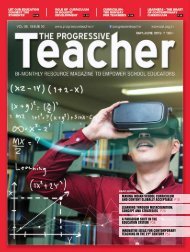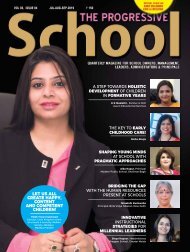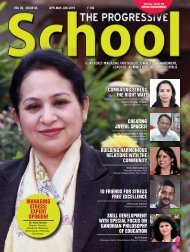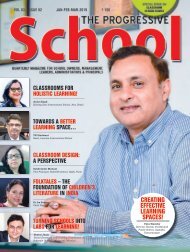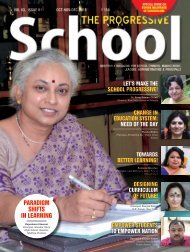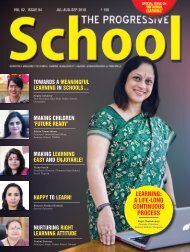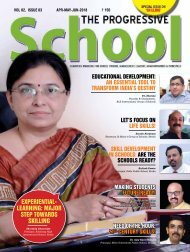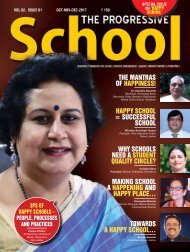The Progressive Teacher Vol 03 Issue 05
This issue of The Progressive Teacher focuses on "Teaching of Social Studies". The magazine provides guidance to the teachers by their peers and school leaders for tackling challenges with innovative ideas.
This issue of The Progressive Teacher focuses on "Teaching of Social Studies". The magazine provides guidance to the teachers by their peers and school leaders for tackling challenges with innovative ideas.
Create successful ePaper yourself
Turn your PDF publications into a flip-book with our unique Google optimized e-Paper software.
eflection<br />
<strong>The</strong> Disappearing<br />
Pillars of Learning<br />
–Vikash Sharma<br />
It is true that from childhood to adulthood we have been part of<br />
a very structured form of education. And it drives us to become<br />
‘capable’ and ‘successful’. It also generates fear and anxiety.<br />
How frightening it is to be regarded as<br />
a ‘failure’! That’s why, we all want<br />
to be part of this rat race. <strong>The</strong> person<br />
who dares to move beyond this order of<br />
things looks ‘ridiculous’; he/she does not fit<br />
into the contemporary notion of ‘success’. But<br />
frankly speaking, we need it; we need to look<br />
beyond this structure because it is destroying<br />
all human possibilities.<br />
Yes, I am talking about the pathology of<br />
a culture of learning which is based on<br />
fear. It would not be an exaggeration to<br />
say that because of this fear we are getting<br />
transformed into machines or manufactured<br />
goods. It is the death of one’s innate curiosity,<br />
uniqueness and creativity. Take a simple<br />
but immensely meaningful illustration: the<br />
hierarchization of minds implicit in the<br />
duality of ‘right’ vs. ‘wrong’ answer. If you are<br />
‘right’ you are destined to be a front- bencher;<br />
and if you are ‘wrong’ you are condemned to<br />
be a back- bencher, and bear its stigma. But<br />
any creative pedagogue would tell you that<br />
this obsession with ‘right’ vs. ‘wrong’ answers<br />
destroys the child’s creativity: the possibility<br />
of plurality of interpretations and answers.<br />
Imagine a situation. ‘What is the name of<br />
India’s national animal?’ You ask a child. And<br />
she surprises you. ‘It is not tiger, it is cat’,<br />
she answers. In a way her answer is not the<br />
‘right’ answer but it is not a ‘wrong’ answer.<br />
Schools become an alienating experience<br />
because in the name of ‘right’ answer they<br />
negate the child’s imagination. <strong>The</strong> heavy load<br />
of bookish knowledge becomes tiring. In this<br />
context it would be appropriate to refer to<br />
an experiential illustration given by Steven<br />
Harrison:<br />
A little boy came from school with a note<br />
from the teacher saying he doesn’t have an<br />
inquiring mind. <strong>The</strong> mother, of course, was<br />
quite upset by the note.<br />
‘You need to have an inquiring mind. I am<br />
going to make you have an inquiring mind. If<br />
I have to keep you studying around the clock,<br />
Vikash Sharma<br />
is editor <strong>The</strong><br />
New Leam –<br />
a magazine<br />
on education<br />
and culture<br />
and lives in<br />
New Delhi.<br />
He finds his<br />
vocation in the<br />
art of pedagogy, photography<br />
and philosophic writing. His keen<br />
interest in innovative pedagogy<br />
led him to explore contemporary<br />
processes of learning and crisis of<br />
education in modern times. He can<br />
be reached at vikashsharma946@<br />
gmail.com<br />
you will have an inquiring mind,’ said<br />
the mother.<br />
<strong>The</strong> boy asked, ‘What’s an inquiring mind?’<br />
‘Oh, don’t ask so many questions!’<br />
I am not devaluing textual/theoretical<br />
knowledge; but it alone, as Harrison’s<br />
penetrating reflection suggests, is not<br />
sufficient to make a child truly alert and<br />
conscious; it is very important to create an<br />
experiential domain that allows the child to<br />
learn, to interrogate, to feel and to internalize.<br />
Possibly Martin Buber—an existentialist<br />
philosopher— elaborated it in the context of<br />
prayer: a dialogue that brings our outer and<br />
inner selves together. Imagine how this prayer<br />
is becoming increasingly difficult. We seem<br />
to be concerned with the outer glamour. A<br />
child— particularly, in an urban/middle class<br />
context— is occupied with techno-material<br />
gadgets; his/her ways of looking at the world<br />
become utterly materialistic; one grows up<br />
with greed and pride. Why is it so?<br />
It is in this context that we can refer to the<br />
prevalent state of the three pillars—home,<br />
community and school— an educationist like<br />
T Makiguchi emphasized for the growth of<br />
the holistic personality of the child.<br />
An ideal home, we love to believe, is about<br />
love and care. But where are the parents?<br />
In this age of ‘efficiency’ and ‘success’ their<br />
workplaces occupy them, demand their<br />
complete attention; the child experiences their<br />
absence: absence of a playful engagement,<br />
absence of abundance of time. Possibly costly<br />
birthday gifts, attractive gadgets and toys<br />
emerge as a substitute. Its consequences<br />
are disastrous. Amidst instant consumption<br />
the child misses out on the ethics of care.<br />
Likewise, where is the community—<br />
its warmth, its intensity of intimate<br />
relationships? Even a civilization like ours<br />
known for its community living, because of<br />
a strange form of modernity that generates<br />
only anonymity and loneliness, is losing its<br />
beauty. And not much needs to be said about<br />
the contemporary practice of schooling—its<br />
drilling and standardization. To quote Tagore:<br />
‘School forcibly snatches away children<br />
from a world full of the mystery of nature’s<br />
own handiwork, full of suggestiveness of<br />
personality. It is a mere method of discipline<br />
that refuses to take into account the<br />
individual. It is a factory specially designed<br />
for grinding out uniform results.’<br />
Yet, hope doesn’t die. Look at the eyes of<br />
children. <strong>The</strong>y inspire us to imagine a new<br />
possibility. And I dare. As I work with a<br />
group of children, I invoke Harrison, Buber<br />
and Tagore. We listen to the rhythm of<br />
Bengali, Tamil, Hindi, Punjabi and English<br />
music; some of us begin to speak three or<br />
four languages simultaneously; we visit a<br />
garden, look at the distinctiveness of each<br />
leaf in a tree; we discuss, reflect, crack jokes,<br />
laugh together; and at the end of the day we<br />
realize this splendid interplay of differences<br />
and symmetry. No bookish knowledge<br />
from a standardized ‘civics’ textbook. No<br />
official/’secular’ mantra: ‘unity in diversity’.<br />
Yet, the child learns. And I too begin to pray:<br />
Let these children grow up with curiosity, with<br />
innocence, with an intimate bond with nature<br />
and their inner selves.<br />
50 <strong>The</strong> <strong>Progressive</strong> <strong>Teacher</strong> Nov/Dec 2016




